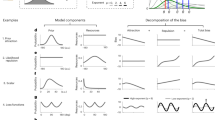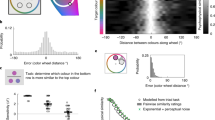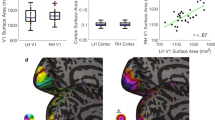Abstract
Variations in the Visual Threshold THE problems of visual research discussed in this lecture mainly concern the sensitivity of the retina. A very general test of retinal sensitivity is the determination of the threshold increment, or, briefly, the threshold. The eye views a given distribution of brightness—which may be varying with time in a prescribed way—and, at a given moment, a small additional light stimulus is applied at a particular point in the visual field. By repeated trials with different intensities of the additional stimulus, the critical intensity can be determined at which the observer sees the stimulus on fifty per cent of occasions. This threshold increment, or better, its reciprocal, provides a measure of the sensitivity of a given part of the retina at a given time. It can be determined under a wide range of conditions, and by varying the angular size, exposure time and colour of the test stimulus the response can be made to depend in different degrees on different mechanisms in the retina.
This is a preview of subscription content, access via your institution
Access options
Subscribe to this journal
Receive 51 print issues and online access
$199.00 per year
only $3.90 per issue
Buy this article
- Purchase on Springer Link
- Instant access to full article PDF
Prices may be subject to local taxes which are calculated during checkout
Similar content being viewed by others
References
Barnes, A. B., and Czerny, M., Z. Phys., 79, 436 (1932).
Stiles, W. S., Rept., Phys. and Opt. Soc., 326 (1932), "Discussion on Vision".
Brumberg, E., and Vavilov, S., Bull. Acad. Sci. U.R.S.S., 919 (1933)
Hecht, S., Shlaer, S., and Pirenne, M. H., J. Gen. Physiol., 25, 819 (1942).
Meetham, A. R., and Lambert, G. E. V., Report to Ministry of Home Security (unpublished) (1942).
Pirenne, M. H., Nature, 152, 698 (1943).
Walters, H. V., and Wright, W. D., Proc. Roy. Soc., B, 131, 340 (1943).
Stiles, W. S., Proc. Roy. Soc., B, 127, 64 (1939).
Helmholtz, H. von, "Handb. Physiol. Optik" (2nd Edit., 1896), 448.
Stiles, W. S., and Smith, T., Proc. Phys. Soc., 56, 251 (1944).
Katz, D., "The World of Colour" (London: Kegan Paul).
Wright, W. D., Proc. Roy. Soc., B, 115, 49 (1934).
Walters, H. V., Proc. Roy. Soc., B, 131, 27 (1942).
Wright, W. D., Proc. Roy. Soc., B, 122, 220 (1937).
Pitt, F. H. G., Proc. Roy. Soc., B, 132, 101 (1944).
Wright, W. D., and Pitt, F. H. G., Proc. Phys. Soc., 47, 205 (1935).
Wright, W. D., Proc. Phys. Soc., 53, 93 (1941).
MacAdam, D. L., J. Opt. Soc. Amer., 32, 247 (1942).
Moon, P., and Spencer, D. E., J. Opt. Soc. Amer., 33, 260 (1943).
Author information
Authors and Affiliations
Rights and permissions
About this article
Cite this article
STILES, W. Current Problems of Visual Research. Nature 154, 290–293 (1944). https://doi.org/10.1038/154290a0
Issue Date:
DOI: https://doi.org/10.1038/154290a0
This article is cited by
-
Die Abh�ngigkeit der Reizschwelle des menschlichen Auges von der Dauer der Lichtimpulse und der Wellenl�nge des Lichtes
Zeitschrift f�r Physik (1954)
Comments
By submitting a comment you agree to abide by our Terms and Community Guidelines. If you find something abusive or that does not comply with our terms or guidelines please flag it as inappropriate.



